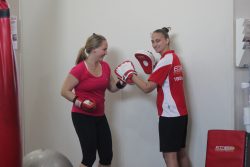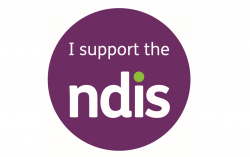 Benefits of Exercise
Benefits of Exercise
We all know that exercise is important for good health, all Australians, including those with a disability can benefit from regular exercise. In fact exercise carries a huge range of benefits including:
- Improving stamina and muscle strength for daily activities
- Increased flexibility and range of motion to reduce aches and pains associated with stiff muscles and joints, as well as reducing risk of injury
- Improved coordination, balance and agility to reduce risk of slips and falls
- Ability to maintain a higher level of independence, sense of freedom and quality of life.
- Help to maintain a healthy body weight – reducing the risk of many chronic diseases and conditions like high blood pressure, heart disease, type 2 diabetes and certain cancers
- Exercise releases endorphins that make you feel good, this can help ease anxiety and depression, plus improve overall mood.
- Exercising with other people is great for social interaction, reducing feelings of loneliness or isolation and may help to build friendships.
- Exercise can help alleviate pain associated with joint swelling and other chronic conditions.
Exercise Recommendations
Australian’s should get at least 30 minutes of exercise every day to obtain these health benefits. Exercise is EVEN more important for people living with a disability because they tend to have a more sedentary lifestyle.
Barriers
Unfortunately living with a physical disability can make it challenging to exercise in a traditional way like playing sport on a team or going into the gym. The barriers to participation in physical activity include a lack of knowledge and skills, fear of exercise, negative attitudes to disability, inadequate facilities, lack of transport, lack of programmes and staff capacity, and cost.
Problems solved
Working with a Fitness Enhancement Personal Trainer can address all these issues:
- Lack of knowledge or skills – a Fitness Enhancement Personal Trainer will guide you through each session, starting with very simple, safe and basic exercises to build up a base level of strength and skills. Every week they will help you build on your knowledge and teach you new things.
- Fear of exercise – often fear of exercise is simply fear of the unknown, or fear of pain/injury. Again having an experienced and knowledgeable Personal Trainer guide you through every exercise, check your technique and modify movements as needed, makes it safe, achievable and pain-free.
- Negative attitudes – sometimes the staff or members of a facility do not have the right attitude to accommodate clients with special needs. In the worst cases, this can lead to discrimination and isolation. Fitness Enhancement is an inclusive organisation and all staff are experienced, knowledgeable, down-to-earth and open-minded. In addition, because we offer 100% private Training you will never need to work with other clients or members if you don’t want to.
- Inadequate facilities – We offer the very Mobile Personal training option which allows a client to Train in the comfort and privacy of their own home which is perfectly suited to their needs, the Trainer will bring a variety of equipment to suit all abilities.
- Lack of programmes/staff capacity – Some facilities do not have the programmes or the staff capability to accommodate clients with Special Needs – at Fitness Enhancement we ensure all our staff are fully qualified, registered and insured to work with clients of all abilities.
- Cost – Through the latest NDIA program, eligible NDIS participants are able to access government-funded funded Personal Training through Fitness Enhancement as we are an NDIS registered provider, so cost is no longer a barrier to participation.
Contact us to find out more!

 Benefits of Exercise
Benefits of Exercise